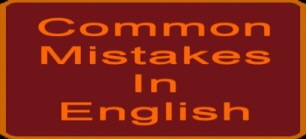
   |
[Essay/영작] (CM-121) "Fool and Foolish", "Rest as an adjective", "Due to as a preposition"
최고관리자 | 20-04-25 13:02

485. Fool and Foolish
(a) Fool
(X) Anne said to me, 'You're fool.'
(O) Anne said to me, 'You're a fool.'
"Fool" is a noun, and requires the article when we use it with the verb to be.
(b) Foolish
(X) Anne said to me, 'You're a foolish.'
(O) Anne said to me, 'You're foolish.'
"Foolish" is an adjective, and can't be used with the article after the verb to be.
Note: A fool or a foolish person doesn't mean an insane person, but one who acts thoughtlessly.
We tend to use "silly or stupid" instead of "foolish" modern usage.
486. Misuse of "rest" as an adjective
(X) I spent the rest day at home.
(O) I spent the rest of the day at home.
Here, "rest" is a noun, and we can't use it as an adjective in the meaning of what's left.
487. Misuse of "due to" as a preposition
(X) William came late due to an accident.
(O) William came late because of an accident.
Don't use "due to" as a preposition meaning "because of".
"Due", as an adjective here, is used correctly only when it qualifies some noun.
eg) His delay was due to an accident. = The accident caused his delay.
1. Use ‘due to’ only to modify nouns.
2. Usage of ‘due to’ is correct, if the sentence makes sense when ‘due to’ is replaced with ’caused by’.
3. Use ‘because of’ to modify verbs.
4. ‘Due to’ & ‘because of’ are not interchangeable.
Example 1: The traffic jam was due to a terrible accident at the intersection.
The phrase "due to" has been used to present the reason for the noun traffic jam.
The reason for traffic jam, grammatically a noun entity, is a terrible accident.
Hence, usage of due to correct in this sentence.
Example 2: The traffic jam happened because of a terrible accident at the intersection.
The phrase "because of" has been used to present the reason for the action happened.
The reason why the traffic jam took place is that there was a terrible accident.
Hence, usage of because of is correct in this sentence.
Example 3: The game was canceled because of rain.
“Because of,” on the other hand, should modify verbs. So you might want to say.
“Was canceled” is a verb phrase, which makes “because of” the right choice.
Example 4: The cancelation was due to rain.
Technically speaking, “due to” should only be used as an adjective and come after a noun.
"Cancelation” is a noun, and “due to” is describing it.
Another easy way to remember the rule is that “due to” can be subbed out for “caused by.”
"A cancelation" can be caused by rain, but to say it was canceled caused by rain just wouldn’t make sense.
Here are a couple more examples to help you visualize the difference:
(O) The business failed because of its poor location.
(X) The business failed due to its poor location.
(O) The business’s failure was due to poor location.
(X) The business’s failure was because of poor location.
   |




